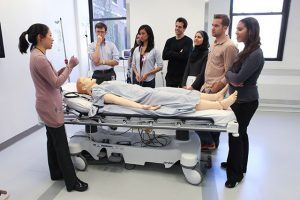Heather MacDonald in City Journal:
 Identity politics has engulfed the humanities and social sciences on American campuses; now it is taking over the hard sciences. The STEM fields—science, technology, engineering, and math—are under attack for being insufficiently “diverse.” The pressure to increase the representation of females, blacks, and Hispanics comes from the federal government, university administrators, and scientific societies themselves. That pressure is changing how science is taught and how scientific qualifications are evaluated. The results will be disastrous for scientific innovation and for American competitiveness. A scientist at UCLA reports: “All across the country the big question now in STEM is: how can we promote more women and minorities by ‘changing’ (i.e., lowering) the requirements we had previously set for graduate level study?” Mathematical problem-solving is being deemphasized in favor of more qualitative group projects; the pace of undergraduate physics education is being slowed down so that no one gets left behind.
Identity politics has engulfed the humanities and social sciences on American campuses; now it is taking over the hard sciences. The STEM fields—science, technology, engineering, and math—are under attack for being insufficiently “diverse.” The pressure to increase the representation of females, blacks, and Hispanics comes from the federal government, university administrators, and scientific societies themselves. That pressure is changing how science is taught and how scientific qualifications are evaluated. The results will be disastrous for scientific innovation and for American competitiveness. A scientist at UCLA reports: “All across the country the big question now in STEM is: how can we promote more women and minorities by ‘changing’ (i.e., lowering) the requirements we had previously set for graduate level study?” Mathematical problem-solving is being deemphasized in favor of more qualitative group projects; the pace of undergraduate physics education is being slowed down so that no one gets left behind.
The National Science Foundation (NSF), a federal agency that funds university research, is consumed by diversity ideology. Progress in science, it argues, requires a “diverse STEM workforce.” Programs to boost diversity in STEM pour forth from its coffers in wild abundance. The NSF jump-started the implicit-bias industry in the 1990s by underwriting the development of the implicit association test (IAT). (The IAT purports to reveal a subject’s unconscious biases by measuring the speed with which he associates minority faces with positive or negative words; see “Are We All Unconscious Racists?,” Autumn 2017.) Since then, the NSF has continued to dump millions of dollars into implicit-bias activism. In July 2017, it awarded $1 million to the University of New Hampshire and two other institutions to develop a “bias-awareness intervention tool.” Another $2 million that same month went to the Department of Aerospace Engineering at Texas A&M University to “remediate microaggressions and implicit biases” in engineering classrooms.
The tortuously named “Inclusion across the Nation of Communities of Learners of Underrepresented Discoverers in Engineering and Science” (INCLUDES) bankrolls “fundamental research in the science of broadening participation.” There is no such “science,” just an enormous expenditure of resources that ducks the fundamental problems of basic skills and attitudes toward academic achievement.
More here.
